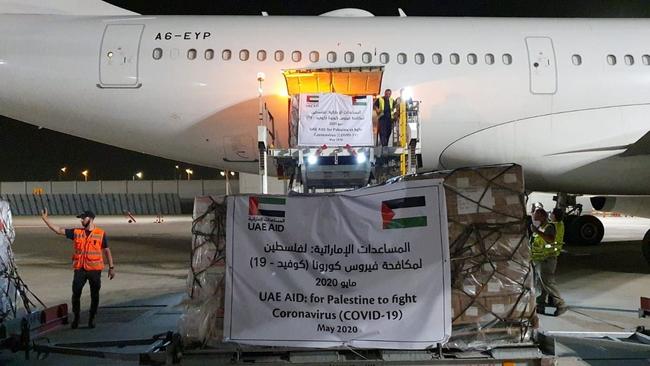UAE breaks ground with Israel flight
A United Arab Emirates commercial airline has flown its first acknowledged direct flight from its capital Abu Dhabi to Israel.

A United Arab Emirates commercial airline has flown its first publicly acknowledged direct flight from its capital, Abu Dhabi, to Israel, a milestone in relations between two Middle East nations with no formal diplomatic ties.
Etihad Airways Flight 9607 landed at Tel Aviv’s Ben Gurion International Airport on Tuesday night with 13 tonnes of medical aid for Palestinians to help them cope with the coronavirus pandemic.
The historic flight came as Israel was suspected of launching a cyber attack that crippled Iranian shipping in the Strait of Hormuz for days, in apparent retaliation after Tehran tried to hack Israeli water purification facilities.
Computers regulating traffic on waterways and roads leading to the Shahid Rajaee port crashed simultaneously on May 9, creating chaos and backups. Satellite images showed stranded ships at sea and kilometres-long queues of trucks on roads leading to the port.
Iran played down its impact but intelligence officials have now told The Washington Post that the cyber attack was the work of Israel and caused far more damage and disruption than the Islamic Republic admitted.
“There was total disarray,” one official from an unnamed foreign government said.
While Israel and the UAE have cultivated deeper relations over the years, the Gulf nation doesn’t officially recognise Israel. The pandemic is creating fresh opportunities for Israel to strengthen its ties with its Arab neighbours, say Israeli, Emirati and UN officials.
Israel has taken a more public approach in recent years in seeking to build relations with the Arab countries, which have maintained a more cautious position as the Palestinian issue is emotive for their people. The US has encouraged both its allies in the region to talk as they counter a common rival in Iran.
“For the first time, an @etihad cargo plane just landed at Israel’s Ben-Gurion airport!” Israel’s top diplomat at the UN, Danny Danon, wrote on Twitter. “Hopefully soon, we will see passenger flights, too. Having visited, I know the UAE is a fascinating place, and look to continue improving relations between our countries.”
Ambassador Lana Zaki Nusseibeh, the top UAE diplomat at the UN, framed the flight as one meant to help the Palestinians rather than a move to improve ties with Israel. “This is an international crisis that requires an international response,” she said.
“The UAE is grateful to UNSCO for facilitating the UAE’s support for the Palestinian people, and for the UN’s tireless efforts to co-ordinate and assist the global fight against the pandemic,” she added, referring to the UN Special Co-ordinator for the Middle East Peace Process.
The flight carried 10 ventilators, medical equipment and personal protective gear to help Palestinians deal with the pandemic, according to UNSCO.
There have been 570 coronavirus cases in the West Bank and Gaza, of which 547 are in the West Bank and East Jerusalem. There are 108 active cases and 464 people have recovered. Four people have died, though none of the deaths has been in Gaza.
Gaza has extremely poor health infrastructure and UN officials have said an outbreak could be catastrophic and overwhelm the strip, but the virus hasn’t spread widely, partly because Israel and Egypt have imposed a blockade on the strip since 2007, when Hamas took control.
The three-hour flight didn’t cross Saudi Arabia’s airspace, instead proceeding over the Persian Gulf, Iraq and Syria, before turning south over the Mediterranean Sea to land in Israel.
The Israeli cyber attack was a deep embarrassment for Iran, given its boasts about its power to close down shipping through the strait, a leading conduit for oil.
The incident did not prevent other shipping from passing through but disrupted operations in Shahid Rajaee for days.
A day before the attack, two rural water distribution networks in Israel were hacked but the intrusion was detected and cut off without damage.
Israel has long had a policy of aggressive retaliation towards Iran, seeking to show that the cost of any attack will be too high.
The Shahid Rajaee retaliation is a cyber equivalent of the punishing strikes Israel has made on Iranian targets in Syria as warnings not to use territory or weapons there to threaten it.
The Wall Street Journal, The Times



To join the conversation, please log in. Don't have an account? Register
Join the conversation, you are commenting as Logout